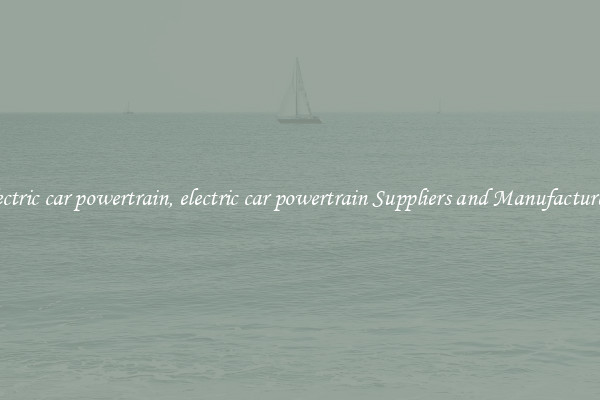electric car powertrain, electric car powertrain Suppliers and Manufacturers
The electric car powertrain is a crucial aspect of electric vehicles (EVs) that enables their efficient and eco-friendly operation. This powertrain includes several components, such as the electric motor, battery pack, and transmission, which work together to power the vehicle and ensure a smooth driving experience.

The electric motor is the heart of the powertrain and converts electrical energy from the battery into mechanical energy to propel the vehicle forward. These motors can be either AC or DC, and they come in various sizes and power outputs to suit different vehicle types. AC motors are more common in EVs as they offer better performance and efficiency.
The battery pack is another vital component of the powertrain, serving as the energy source for the electric motor. These battery packs are typically made up of multiple lithium-ion batteries, which store large amounts of energy and provide the required voltage and current to power the motor. Advances in battery technology have significantly increased the range and performance of electric vehicles, making them a popular choice for environmentally-conscious consumers.
In addition to the motor and battery, the powertrain also includes a transmission system. Unlike traditional internal combustion engines, electric motors have a high torque range even at low speeds. This eliminates the need for a complex transmission system, typically reducing the number of gears to just one or two. This simplicity leads to fewer maintenance requirements and a smoother driving experience.
To ensure the availability and quality of electric car powertrain components, there are numerous suppliers and manufacturers in the market. Some well-known global powertrain suppliers include Bosch, Siemens, Continental, and ZF Friedrichshafen. These companies provide a range of powertrain solutions, including electric motors, inverters, and battery management systems, which are integrated into EVs by automobile manufacturers.
Moreover, several specialized electric car powertrain manufacturers have emerged, focusing solely on EV powertrain production. For example, Tesla, one of the leading electric car manufacturers, produces its own powertrains designed specifically for its vehicles. Other notable powertrain manufacturers include BYD, LEVC, and Rivian, which supply powertrains to multiple EV makers.
These suppliers and manufacturers play a critical role in the development and adoption of electric vehicles. Their continuous research and development efforts aim to improve powertrain efficiency, increase the range of EVs, and reduce manufacturing costs. This fuels the ongoing transition from fossil-fueled vehicles to electric mobility and encourages innovation in the industry.
In conclusion, the electric car powertrain is a key component that enables the efficient and eco-friendly operation of electric vehicles. With the support of various suppliers and manufacturers, the powertrain sector continues to evolve, driving advancements and making electric mobility a viable and sustainable transportation option.

View details

View details

View details

View details







